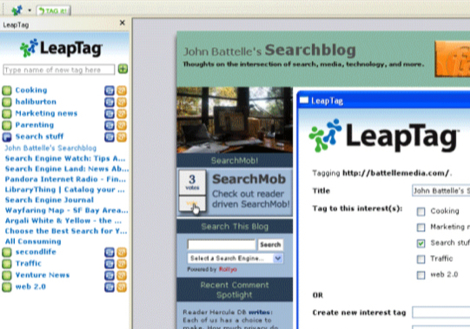LeapTag - a new way to find online content


I've been test driving LeapTag, a new browser add-on for finding content related to topics of interest to you that combines a number of unique ideas I've not seen in similar tools. LeapTag, as the name implies, uses tags you define to conduct searches for related content. To help understand your interests and readng preferences, LeapTag can import tags from your del.icio.us account to build a keyword list and allows you to select blogs from your RSS subscriptions to establish a baseline for the kid of news and opinion you like to read. You can import RSS subscriptions from Bloglines, NewsGator Online, or Google Reader in the current beta version.
Once the initial setup is complete, LeapTag uses its algorithmic search to generate a page full of related content from blogs and news sites that you can vote up (relevant), down (rrelevant), or simply remove from the results (null). On the right side of the LeapTag page, a row of ads featuring books, music, and videos (pulled from Amazon) is displayed that you can rate in similar fashion. LeapTag is a free tool supported by these ads which are nicely formatted and not terribly distracting.
You can also add an entire web page to your LeapTag collection as shown in the screen shot above. In the current public beta, you're limited to 20 tags so I've been adding and pruning from my list to find the best set to use in evaluating this tool. The initial results appear pretty quickly and, once voted up or down, you can force a refresh which will grab additional content based on your votes or you can wait until the next processing cycle to see what additional content LeapTag has found. Never being particularly patient, I've been tending to push things along to get a sense of how the subsequent refreshes narrow down the focus.
A unique aspect that I particularly appreciate is that LeapTag does not upload any of your information to a server somewhere in the cloud. A small executable application is installed along with the browser add-in and all the data crunching is performed locally. Only the actual algorithmic result is sent to LeapTag to generate a search process – your personal data (RSS subs, del.icio.us tags, and votes) are kept on your PC. That's a very welcome approach to keeping personal data personal.
LeapTag is available for both Internet Explorer (6 and 7) and Firefox on Windows. Currently it is only available for use with Firefox on the Mac. If you're attending the Web 2.0 Expo in San Francisco this week, you can visit with the LeapTag team in booth #8 in the Long Tail Pavilion.
This is a decidedly different approach to finding relevant content based on your interests. It's not a bookmark manager or a feed reader. Rather, it's a way of leveraging the data points you've collected in those tool frameworks to drill down on specific topics of interest. I plan to continue this evaluation and see how, over time, I can employ LeapTag as a research tool to find content I might otherwise be unaware of as I researching my current topics of interest.